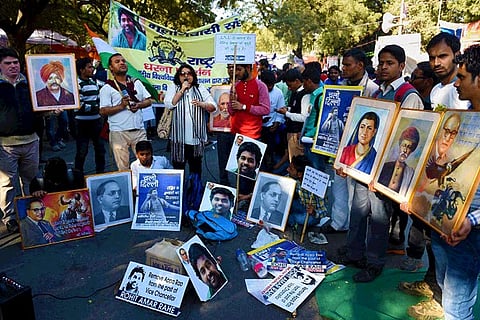

The Information and Public Relation Department of the Kerala government has banned the usage of the terms ‘Dalit’, ‘Harijan’ and ‘Keezhalan’ from all official publications. While ‘Harijan’ and ‘Keezhalan’ are terms that the community has shunned, is that true for the word ‘Dalit’? Is it wrong to call someone a Dalit - is it a derogatory term?
While many people on social media think so, especially when the term is used in news reports, Dalit activists say that the truth is far from it. The word, in fact, is a term of empowerment used by the community for themselves.
‘Dalit’ comes from the Sanskrit word ‘dal’, meaning ‘broken, downtrodden, or oppressed.’ It was believed to have first used by Jyotirao Phule, founder of the Satya Shodak Samaj, in the nineteenth century. He used the term for ‘untouchables’ and victims of caste based oppressions. BR Ambedkar popularised the term Dalit.
“The term Dalit has strengthened our standing in the society,” activist and writer Sunny M Kapikad tells The News Minute. “By banning the term, they want to clear off the large space and power created by Dalits. This is not right,” he adds.
He also slammed the officers who are behind the new rule, and insisted that the word ‘Dalit’ should be used as one of empowerment.
“Nowhere in India it is said that Scheduled caste and Scheduled tribe terms should be replaced with term ‘Dalit’. So, there is no need of such an order,” he says.
The order was issued based on the directive from Kerala State Commission for Scheduled Castes and Scheduled Tribes Chairman Justice PN Vijayakumar.
“How can Vijayakumar say that Dalit is derogatory?” Sunny asks. “The word ‘Dalit’ has created a space where we speak about untouchability and oppression. Ambedkar used this word and popularised it. It is a term that denotes empowerment. We are proud to be called as Dalits. How can someone decide it is derogatory?” he asks.
Activist Rekha Raj also holds a similar view, and says that government’s technicalities sometimes don’t match the present social developments and debates in the country. “The word Dalit has got gravity. This rule was brought in without considering the significance of the Dalit space,” she says.
She also points out that to an extent, it doesn’t matter what technical terms are used by the government. “It is just a technical thing. But Dalit politics is a much larger concept, which doesn’t really come under the government alone. So, we should not tangle this empowerment centred Dalit politics under the state or government,” she says.
Binesh Balan, a Dalit student who recently joined University of Sussex, after he got National Overseas Scholarship for Dalits had a different opinion: Whether someone should be called a ‘Dalit’, he says, depends entirely on the person.
“It is completely personal, and if someone doesn’t want to be called a Dalit, he has every right to deny the term. One cannot be forced to call themselves a Dalit. There may be some young people from Dalit communities, who come into the mainstream for the first time and believe that calling them a different term is a way of differentiation. However, it depends on individual choices,” he says.
Edited by : Ragamalika Karthikeyan